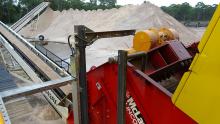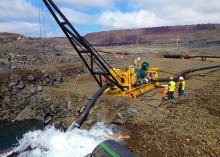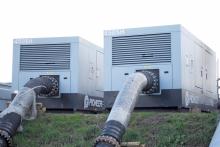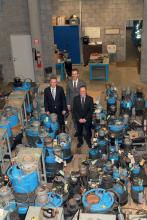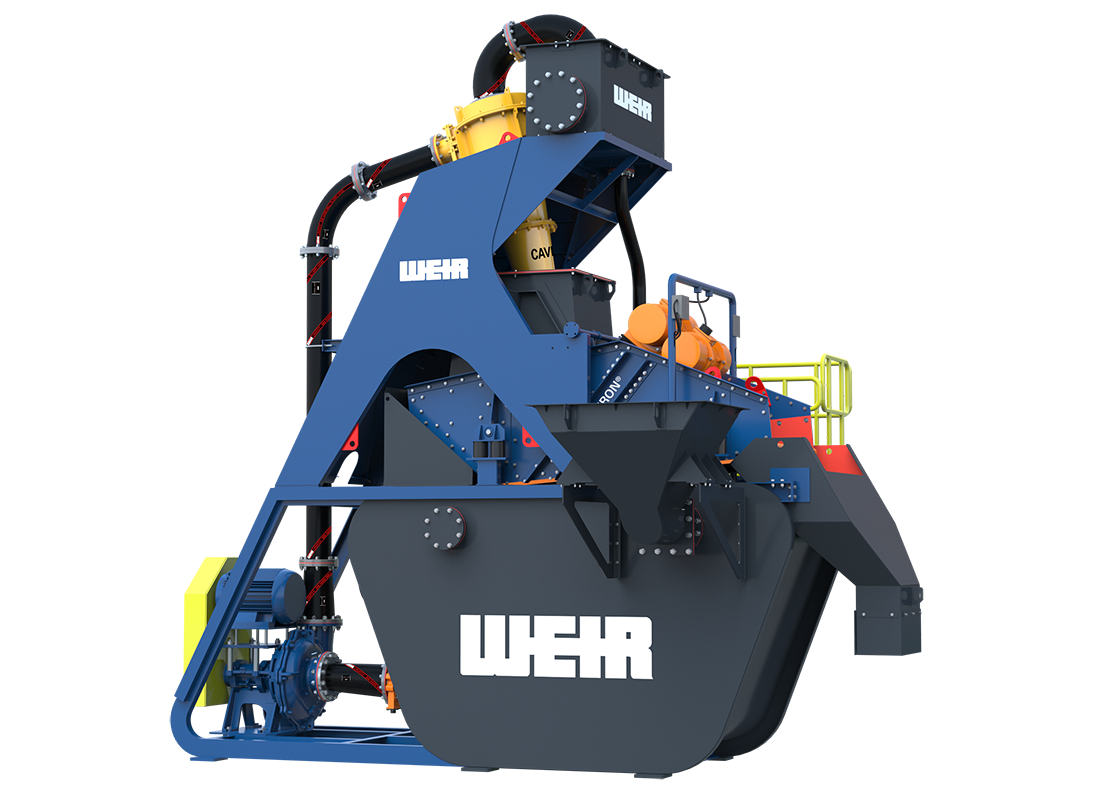
Water availability and wastewater management are an area of strong focus for quarrying and mining operators as additional restrictions are being placed on water extraction from the natural environment, making the recycling of process water a must for quarrying operators.
Managing process water, reclaim systems, dust suppression and pit dewatering are essential to the success of a sand and aggregates project.
By managing these processes efficiently, quarry sites can process more product faster, while lowering their water bill and eliminating the need for double handling, according to Simon Jones, product manager for pumps at Weir Minerals Europe.
“Most quarries use water in the washing and processing of their products,” Jones says. “For example, sand washing, a necessary step for producing high-quality sand, utilises both recycled and clear water.”
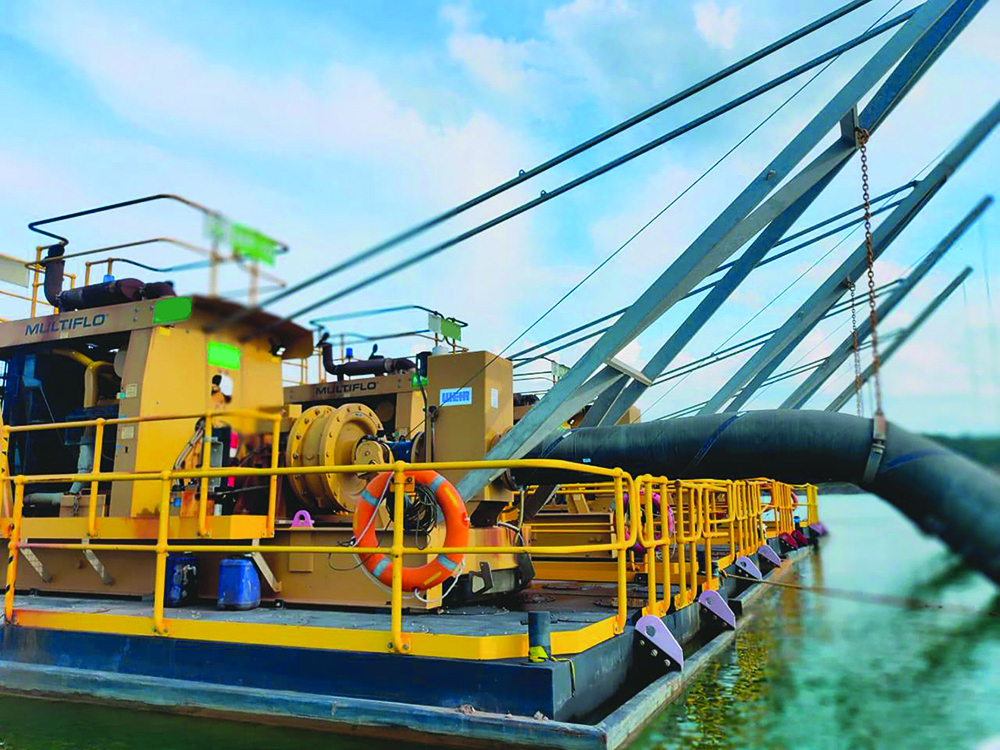
Jones adds that, once the sand has been processed, wastewater containing product fines and additional wastewater runoff from the stockpiles make their way to storage or tailings dams. All these water sources need to be managed effectively for the quarry to keep their operational costs under control.
“Ensuring the water level balance is maintained is important to everyone,” says Jones. “Regardless of what is being processed you will always need to move water from point A to point B.”
The new decade has brought to light new problems for fluid transport, from introduction of water restrictions on urban water supplies to climate change affecting the supplies of non-potable groundwater (rainwater, groundwater and stormwater). By transporting and making use of water already available on site, quarries can reduce the cost of water licences and make their investment go further.
“There is an increased awareness of the benefits that can be achieved through efficient water management,” explains Jones. “We are partnering with our customers to explore the challenges quarries are facing when pumping water around a site and helping to develop optimal solutions for specific and bespoke applications.”
Pumps designed to handle increased suspended solids in water whilst operating at high discharge head pressures could be the answer. The Weir Minerals Warman DWU pump is designed to transport surface water from dams and ponds on-site back to the washing circuit for recycling. Jones says that other on-site water sources, such as tailings dams, might make better use of a pump house or a customised Weir Minerals Multiflo barge solution.
“There are multiple options for reclaiming water within a quarry,” continues Jones. “Because we engineer our solutions in-house, we can create a resolution based on a customer’s needs and budgets.”
He says that in 2021 it is no longer just about moving water around a site, and that now quarries need to work toward closing the loop of water use in their processes. Regulatory and government bodies around the world have begun implementing guidelines for the management of water in quarries. These guidelines promote site water management proposals founded on the principles of waste minimisation and active promotion of the reduction, reuse and recycling of wastewater.
The new planning and allocation of water resources covers reducing, reusing, recycling and recovering water wherever possible. Jones says that equipment optimised to handle water not only reduces its losses and boosts efficiency, but also frees up water resources that can be used elsewhere in the process for necessary site duties such as dust suppression. He adds that installing equipment like the Weir Minerals Sand Wash Plant, specifically designed to produce a drier end product, can improve water recovery by up to 35% compared to common sand screw plants.
“We’re out on site with our customers every day,” Jones says. “We see how hard they work, and we know how precious each and every recoverable resource is. Installing a custom-engineered solution such as the Weir Minerals Sand Wash Plant doesn’t just provide customers with a drier aggregates product after processing but creates a whole new by-product in ready-to-use recycled water.”
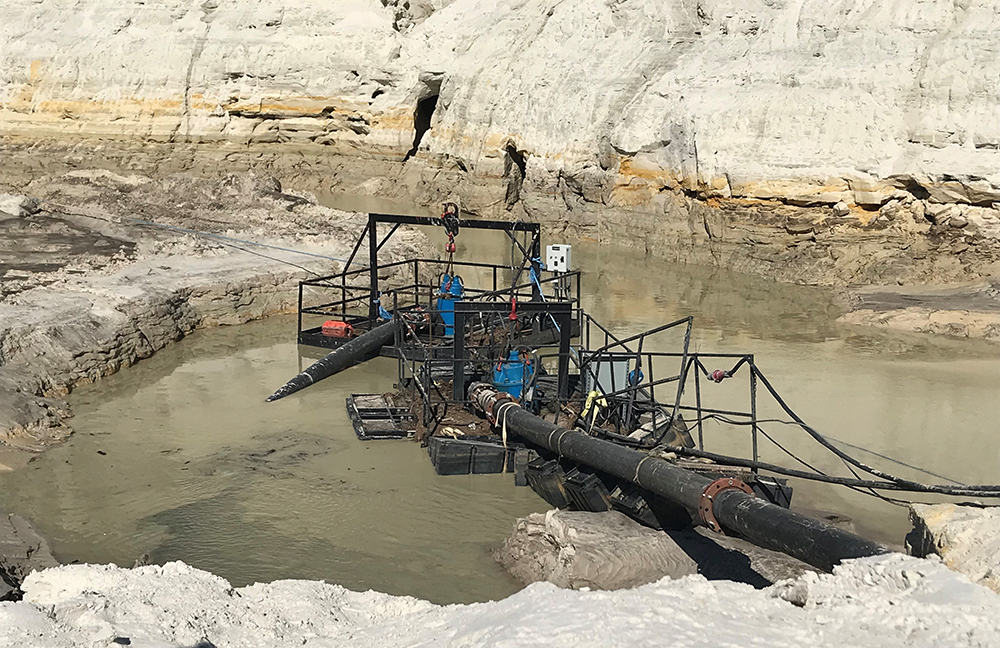 Japan-headquartered Tsurumi has set out what to consider when choosing pumps for quarry applications.
Japan-headquartered Tsurumi has set out what to consider when choosing pumps for quarry applications.
The pump manufacturer says that managing water is one of the most consequential aspects in sand and gravel-processing operations and, to achieve optimum results, employing the right pumps is key.
Jeff Davis, western regional sales manager at Tsurumi America, said that because of the diverse range of applications on a quarry site, a variety of pumps is required. Using the correct pump for each application is critical to overall cost savings and may significantly improve a quarry’s bottom line.
“For example, for site dewatering, there are several factors that will determine the proper pump choice, such as vertical and horizontal discharge head and flow requirements. If the water used in the washdown process comes from a distant source, or deep down in a pit or reservoir, you will need a high-head, high-pressure pump,” said Davis. “However, if you need to move light to medium slurry, a pump with an agitator would be a better choice. A high chrome impeller and agitator will withstand the abrasive nature of the slurry while suspending the settled solids for better transfer.”
The type of power supply available on site is another factor to take into consideration when determining which pump should be used in a quarry application. There is a wide range of single-phase and three-phase pumps on the market to fit different needs. Typically, higher capacity and higher horsepower pumps require three-phase power while some applications may only require smaller, single-phase pumps.
Davis says that high-volume dewatering pumps are sometimes necessary to remove rain or floodwater from a site. Tsurumi’s GSZ Series (between 30hp and 200hp and over 5,000 gallons per minute (gpm) and the KRS Series (between 3hp and 50hp and up to 4,500gpm) are designed with powerful 4- and 6-pole motors running at slower impeller tip speed, which extends their parts wear life by up to three times the average length.
Both series feature heavy-duty, cast-iron construction materials with optional high-chrome wear parts, which prevent premature wear and failure from the abrasive materials found in mining, aggregate and construction applications. If heavy abrasives are present, many of these models can be easily converted to agitator pumps for quarry and gravel pit dewatering.
In terms of supplying process water, Tsurumi’s LH and LHW series handle high flows with extremely high-head capabilities, which the company says makes these pumps a perfect fit for long-distance horizontal and/or vertical water transfer in aggregate plants.
The LHW Series can reach a maximum head of 750ft. Both lines feature replaceable high chrome, semi-open impeller, and adjustable wear rings, which provide increased wear resistance when handling abrasive liquids. Horsepower ranges between 4hp and 150hp on the LH Series. GSZ Series horsepower ranges from 30hp to 200hp. The GSZ Series can reach over 5,000gpm and 230ft of head.
Tsurumi says that its HS and NK Series are ideal for handling heavy duties on the site, such as pumping water containing sand, solids and debris with minimal wear and clogging. The single-phase pumps offer the option of operating with agitators, which makes them suited for pumping the muddy liquid accumulated on the ground that results from the aggregate washdown process.
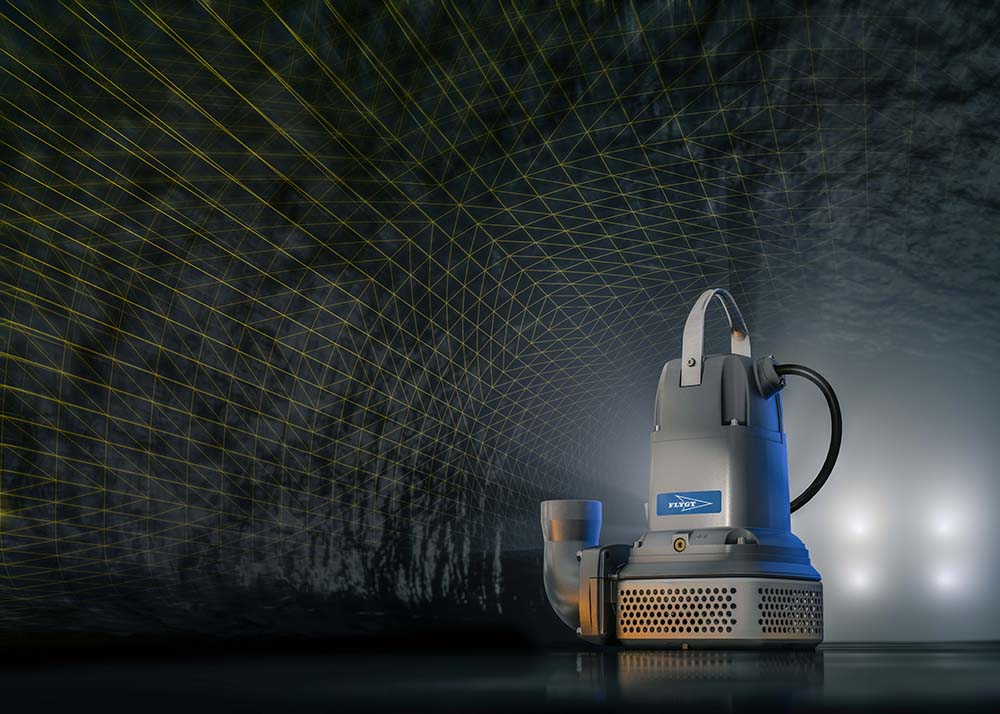
For sludge and slurry pumping, the powerful Tsurumi three-phase models feature an abrasion-resistant impeller and agitator. The agitator creates a downward current, assisting the pump to suspend and transfer solids more effectively. The cast-iron pump body of KTD and KRS models is designed to ensure that durability is greatly enhanced over standard aluminium-bodied pumps. The top discharge design allows installation in tight spaces and provides motor heat dissipation as the water passes over the motor housing. KTV models are also designed with space limitations in mind, featuring the same top-discharge, while offering greater portability due to die-cast aluminium housings and specially treated synthetic rubber parts to deliver a significant weight reduction.
Tsurumi says the GPN and GSD heavy-duty agitator pumps boast exceptional durability, including high-chrome cast impellers and agitators for abrasion resistance and slower impeller tip speeds with 4-pole and 6-pole motors.
Water technology company Xylem has unveiled Flygt Bibo – a dewatering pump that is claimed to dramatically reduce energy, wear and tear, and maintenance costs. The company says it will pioneer the next generation of smart pumps by bringing built-in intelligence to quarrying and other industrial dewatering.
The manufacturers says that Flygt Bibo applies decision intelligence to automatically adapt to its environment and only operates when needed, delivering claimed energy savings of up to 60% when compared to traditional dewatering pumps.
Operational wear and tear are also reduced by up to 70% as instances of snoring and dry running are minimised, which Xylem says leads to as much as a 50% reduction in repair and maintenance costs. Additionally, due to its compact and stable design, Xylem says that Flygt Bibo breaks the mould of traditional dewatering pumps with 30% fewer components, reducing the amount of inventory needed.
Commenting on the launch, Anders Casselbrant, global product manager, submersible dewatering products at Xylem, said: “At Xylem, we work with customers and communities across the world to bring digital transformation to the water sector. That includes the delivery of digital solutions that can optimize business processes to create more efficient and sustainable operations.
“By bringing this new, innovative technology to market, we can offer our customers an extremely reliable, compact and easy-to-use pump. The pump’s plug-and-play capability means no configuration is needed — the pump can easily slot into existing operations.”
Flygt Bibo offers two different running modes which can be interchanged depending on the application and operating environment. Adaptive mode is typically used when there is a requirement to maintain a constant low water level in the sump – the pump will never stop running, though it will regulate its speed after inflow. If snoring is detected, the pump will slow down to reduce wear, but when water re-enters the sump, the pump will increase its speed until the water level is low again.
By letting the pump run continuously, there is no need for any additional sensor. The incoming water triggers the pump to run, so it will always be ready to respond to changeable conditions in the field.
Level mode consists of two pre-set levels, a start level that is controlled with a built-in-pressure sensor to detect water levels, and a stop level that is triggered when the pump detects snoring. As the pump only operates when needed, for example, when water is above the set level, Xylem says this optimises efficiency and reduces both energy consumption and operational wear.
Built on the same integrated power electronics and systems platform as Xylem’s wastewater pump, Flygt Concertor, the new Flygt Bibo automatically adapts to the speed and performance in a field instead of a static curve, meaning that the 8kw pump can deliver performance that spans the range of a 2kW standard pump, up to a 10kw standard pump.
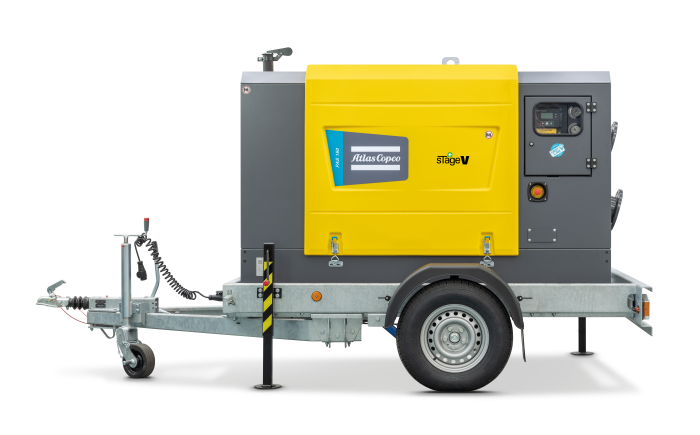
Xylem says the launch of Flygt Bibo follows rigorous field testing at the Renström mine in Sweden, one of Europe’s deepest mines. After three years of continuous collaboration and testing with mine operator New Boliden, Flygt Bibo is claimed to have delivered product and repair savings of 40%, and New Boliden has reduced the cost of its dewatering processes by almost 30%.
Commenting on the partnership, Mats Isaksson, senior development engineer at New Boliden, said: “Xylem’s Flygt Bibo has provided New Boliden with access to a pumping system that can automatically adapt to its environment, accommodating in real time as conditions change in the field. This new approach to dewatering has transformed our operations, allowing our mining processes to continue without interruption.”
Due to the success of the field test at Renström, New Boliden has placed a sizable order for more Flygt Bibo pumps to advance its goal of developing the world’s first fully autonomous mine.
Flygt Bibo is now available for purchase or rent in the Netherlands, Finland, France, Germany, Italy, Poland, Portugal, Russia, Spain, Sweden, and Africa. The pump is expected to be available to customers globally later this year.
Atlas Copco Power & Flow has launched two new PAS dewatering surface pumps with robust proprietary HardHat technology. The manufacturer says the lightweight but tough canopy means the PAS 100 and PAS 150 pumps are durable and easy to service, providing excellent long-life, high performance while minimising downtime.
The exclusive HardHat polymer is resistant to corrosion and the effects of extreme temperatures and harsh operating environments. As such, it is maintenance free. Furthermore, the canopy is resistant to discoloration, which is especially important for rental companies, as the equipment’s resale value is maximized. Additionally, the HardHat doors can be painted in any colour depending on the customers’ requirements.
Atlas Copco says its novel hinged-door design on the pump itself means that the pumps provide superior serviceability on site. All components are easy to access for simple servicing and maintenance, and the pump can be cleaned and restarted in three minutes and serviced in under 60 minutes, which is 10% quicker than previous models.
“Our HardHat technology is a tough polyethylene resin material proven in the field to protect equipment’s most vital and expensive core components. It has been incorporated on Atlas Copco’s compressor and light tower range for over 15 years and we’re delighted to now extend the technology to our PAS pumps so customers can better protect their investment,” says Saksham Dube, product marketing manager at Atlas Copco Power & Flow. “The canopy on the PAS pump range has traditionally been metal. However, we have worked closely with our customers to fully understand their needs for increased durability on site.”
The compact and versatile pumps are easy to move around a site and provide continuous operation for 24 hours. The pumps feature an advanced PW series control panel, so the operator has total control over the application, as well as including the Atlas Copco FleetLink telematic system. This intelligent telematics system allows operators to easily monitor and manage their entire fleets remotely.
The PAS pump range is designed for multiple applications, from dewatering on construction and mining/quarrying sites to solids removal, drainage, and even emergency flooding situations.
The pumps are available in three package options – standalone, or with a galvanised undercarriage or skid – making them suitable for rental companies.

